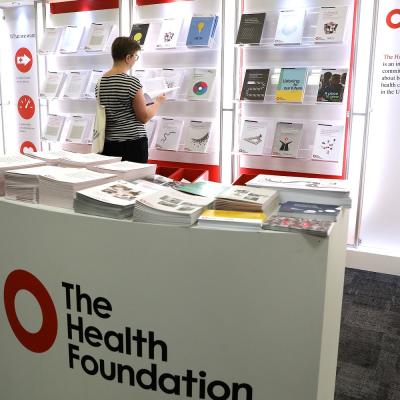BMJ Research Forum 2023
Wednesday 13 December 2023, 8.00–19.30
Thursday 14 December 2023, 9.00–16.10

- The Health Foundation is supporting the second BMJ Research Forum conference on 13–14 December 2023.
- The BMJ Research Forum is an annual conference that brings together the medical research ecosystem in order to drive forward research impact.
- The two-day conference will be in-person and hosted at BMA London.
The BMJ Research Forum will bring together experts from research funding organisations, policymakers, people with lived experience, research leaders and editors to discuss the big questions that cut across the medical research community.
Colleagues from the Health Foundation will be speaking at various research sessions, panel discussions and interactive workshops, so do come and hear from our experts and meet representatives from our organisation.
View the full BMJ Research Forum 2023 conference programme.
Sessions with Health Foundation speakers
AI offers great potential for the generation of evidence, with machine learning tools and techniques being harnessed to speed up processes of literature review and synthesis. However, the latest innovations in this field, for example ChatGPT, mean that humans are increasingly being removed from the loop and the transparency of processes are more opaque. How far content is free from bias is harder to determine. For organisations such as The Health Foundation and NICE, who have a role in contributing to and drawing recommendations from the evidence base, trust in what they produce is vital. But how can organisations using such tools provide assurance that what they produce is trustworthy? Both organisations will talk about recent work harnessing machine learning, discuss the challenges they are grappling with and explore some of the pressing questions facing researchers, policy makers and anyone either producing or using evidence.
Speakers:
- Dr Justine Karpusheff, Assistant Director of Research, The Health Foundation
- Fiona Glen, Programme Director, National Institute for Health and Care Excellence (NICE)
- Dr. Mariam Sood, Senior Data Scientist, National Institute for Health and Care Excellence (NICE)
- Axel Kaehne, Professor in Health & Social Care, Edge Hill
The goal of this workshop is to build an understanding of the data challenges that exist in building a responsive health system that is better able to meet the needs of the population and to identify possible solutions. This will be an interactive workshop and will cover the need for data and analysis in building a responsive health system, as well as the key data challenges that exist. Participants will have the opportunity to debate and compare different approaches and perspectives to addressing these challenges and to generate and evaluate potential solutions and strategies to address these challenges. This will be an opportunity to build links with people working in similar areas or who are facing similar challenges.
Speakers:
- Arlene Gallagher, Senior Analytical Manager, The Health Foundation
- Kathryn Marszalek, Senior Analytical Manager, The Health Foundation
The panel session will explore current and future funding models that have the potential to accelerate and expand access to funding for research and innovation. The recent Independent Review of Research Bureaucracy recognised that although research bureaucracy has an important role in accountability, transparency, quality control, fairness, and safeguarding in the research system, bureaucracy in research currently goes beyond the essential and risks stifling innovation. Research funders have therefore begun to explore innovative ways to reduce the burden and barriers on organisations and individuals applying for and in receipt of funding. This had given rise in some sectors to ‘fast and flexible research funding’ – described as unbureaucratic funding schemes with fast submission, review and implementation times, and schemes that have long-term, multi-year funding with high levels of investigator discretion in the research undertaken during the funding period. The panel will discuss their experiences and work in this field and explore the future of ‘fast and flexible funding’.
Panellists:
- Dr. Daniela Rodriguez, Research Leader, RAND Europe
- Jonathan Grant, Founding Director, Different Angles Ltd
- James Wilsdon, Co-Founder and Executive Director, RoRI
- Anne River, Assistant Director Insight and Evaluation, National Institute of Health and Care Research (NIHR)
- Philip Clarke, Professor of Health Economics and Director of the Health Economics Research Centre (HERC), University of Oxford
Online approaches have the potential to engage participants in research at speed and at scale, but they also bring multiple conceptual and practical challenges. In this session, an inter-disciplinary team will reflect on their learning from a programme which aimed to co-design a definition of good NHS staff engagement during times of change. Through multiple phases, over 300 hundred participants reflected on their experiences of engagement, defined what features of engagement were most important, and collaborated to design an approach to measuring engagement. Bringing together different perspectives from a researcher, a project manager, an online research specialist and (anyone else) the session will prompt a reflective discussion from the team – and audience – on what is really needed to make online collaboration in research work, how best to create impact, and what they would do differently if they could do it all again.
Panellists:
- Dr. Matthew Hill, Head of Insight, Evaluation and Research, Q Community, The Health Foundation
- Kate Allison, Project Manager, Q Community, The Health Foundation
- Sam Minter, Marketing Executive, THIS Labs
- Dr Jordan Moxey, Science Programme Manager, THIS Labs
- Dr Jenni Burt, Head of Science, THIS Labs
Speakers:
- Hardeep Aiden, Research Manager, The Health Foundation
- Sarah Rae, Co-Chief Investigator, The Health Foundation
- Sarah O’Brien, The Health Foundation
Speakers:
- Anna Ramsay, Senior Research Programme Lead, The Health Foundation
- Shaun Leamon, Research Manager, The Health Foundation
Work with us
We look for talented and passionate individuals as everyone at the Health Foundation has an important role to play.
View current vacanciesThe Q community
Q is an initiative connecting people with improvement expertise across the UK.
Find out more

